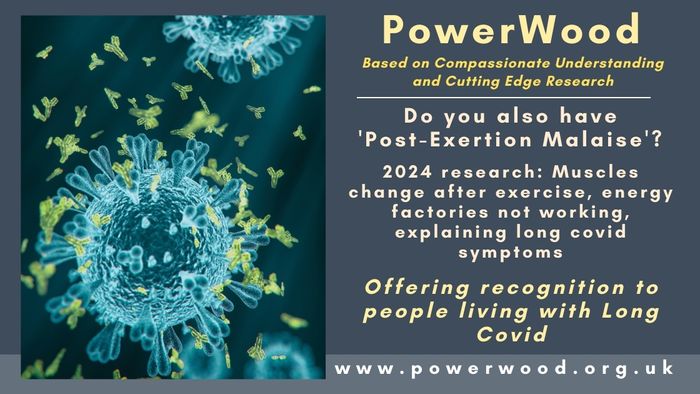
Living with a long term condition like long covid is challenging and it is helpful if the people around us have an understanding of what is going on for us and feel compassion for us and what it is that we are struggling with.
Unfortunately many people with long covid have not been taken seriously by family, friends and professionals, for example they might not be believed, and told they exaggerate, that the illness only exists in their head, and might have been told to exercise more, despite it making their symptoms worse.
New research (January 2024) explains common symptoms of people living with long covid: the worsening of fatigue and pain after mental or physical exertion, what the researchers call ‘post-exertion malaise’.
This research looked into the biological causes of long covid. It was crowd funded in the Netherlands and has found a biological explanation for the exhaustion experienced by people living with long-covid. Read below the abstract*. Hopefully this is a first step towards new ways of supporting people living with long covid towards more energy and a more fulfilling life.
Who came up with the idea of this research?
The 🏆 is for Dr M. van Vugt, professor of Internal Medicine, specialising in community-centred control of tropical infections, at the University of Amsterdam’s Faculty of Medicine (AMC-UvA) .
The following summarises an article in the Dutch Newspaper NRC:
In a recent study conducted by researchers affiliated with Amsterdam UMC and Vrije Universiteit Amsterdam, it has been revealed that muscle tissue undergoes changes in post-COVID patients after strenuous physical exertion. This marks a significant shift from the common advice given to such patients, urging them to engage in exercise for their well-being. Diewke de Haen from the patient organisation PostCovid NL notes that this acknowledgment challenges the conventional wisdom and emphasizes the potential detrimental effects of such recommendations for post-COVID (or long COVID) individuals, leading to observable deterioration.
The scientific investigation, published in Nature Communications* in January 2024, showcases findings indicating muscle tissue necrosis and reduced oxygen uptake in cells among 25 post-COVID subjects following intense physical activity. Professor Michèle van Vugt, a specialist in internal medicine and infectious diseases at Amsterdam UVA/UMC, conceived the idea of examining muscles after receiving complaints of severe muscle pain from post-COVID patients. The study, supported by crowdfunding, sheds light on the biological basis for the persistent symptoms, such as extreme fatigue, muscle pain, and cognitive impairment, associated with long COVID.
The disruption of energy-producing organelles, mitochondria, by the Sars-CoV-2 virus has now been scientifically proven, affirming suspicions raised in previous American research. Despite progress in understanding post-COVID complications, uncertainties persist. Professor Van Vugt stresses the need for further research to unravel the underlying causes of mitochondrial disruption, aiming to develop effective treatments for patients grappling with these issues. The study’s significance is underscored by personal accounts, like that of Mariska Hoos, an ambulance nurse who participated in the research, illustrating the profound impact of post-COVID complications on individuals’ daily lives and the pressing need for specialized care and awareness among healthcare professionals.
——-
Besides Dr M. van Vugt, also a huge thank YOU 🧡 to all the people standing up for people living with long COVID by facilitating, organising and executing this research.
Abstract*
A subgroup of patients infected with SARS-CoV-2 remain symptomatic over three months after infection. A distinctive symptom of patients with long COVID is post-exertional malaise, which is associated with a worsening of fatigue- and pain-related symptoms after acute mental or physical exercise, but its underlying pathophysiology is unclear. With this longitudinal case-control study (NCT05225688), we provide new insights into the pathophysiology of post-exertional malaise in patients with long COVID. We show that skeletal muscle structure is associated with a lower exercise capacity in patients, and local and systemic metabolic disturbances, severe exercise-induced myopathy and tissue infiltration of amyloid-containing deposits in skeletal muscles of patients with long COVID worsen after induction of post-exertional malaise. This study highlights novel pathways that help to understand the pathophysiology of post-exertional malaise in patients suffering from long COVID and other post-infectious diseases.
January 2024: Muscle abnormalities worsen after post-exertional malaise in long COVID*
*Appelman, B., Charlton, B.T., Goulding, R.P. et al. Muscle abnormalities worsen after post-exertional malaise in long COVID. Nat Commun 15, 17 (2024). https://doi.org/10.1038/s41467-023-44432-3
Tine’s Personal experience
If you would like to read more about the personal experience of living with long covid you might find Tine’s blogs inspiring (scroll down to see a preview of her blogs).
©2024 Simone de Hoogh, senior coach and educational and parenting consultant, and founder of PowerWood. All posts by Simone de Hoogh
What PowerWood offers
Explore PowerWood and uncover the myriad opportunities it presents for you. Learn how you can become part of our vibrant community and contribute to our mission of supporting families and (young) individuals living with neurodivergence. Join us in our journey to provide support and empowerment, from the perspective that neurodiversity is a positive force for change in society. Discover PowerWood
